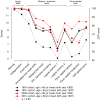Does cognitive function increase over time in the healthy elderly?
- PMID: 24244332
- PMCID: PMC3823862
- DOI: 10.1371/journal.pone.0078646
Does cognitive function increase over time in the healthy elderly?
Abstract
Background: In dementia screening, most studies have focused on early cognitive impairment by comparing patients suffering from mild dementia or mild cognitive impairment with normal subjects. Few studies have focused on modifications over time of the cognitive function in the healthy elderly. The objective of the present study was to analyze the cognitive function changes of two different samples, born > 15 years apart.
Method: A first sample of 204 cognitively normal participants was recruited in the memory clinic of Broca hospital between 1991 and 1997. A second sample of 177 cognitively normal participants was recruited in 2008-2009 in the same institution. Both samples were from the same districts of Paris and were assessed with the same neuropsychological test battery. Mean cognitive test scores were compared between 1991 and 2008 samples, between < 80 years old and ≥ 80 years old in 1991 and 2008 samples, and finally between subjects < 80 year old of 1991 sample and subjects ≥ 80 years old of the 2008 sample. Means were compared with T-tests stratified on gender, age-groups and educational level.
Results: Cognitive scores were significantly higher in the 2008 sample. Participants < 80 years old outperformed those ≥ 80 in both samples. However, participants < 80 years old in 1991 sample and subjects ≥ 80 in the 2008 sample, born on average in 1923, performed mostly identically.
Conclusion: This study showed a significant increase of cognitive scores over time. Further, contemporary octogenarians in the later sample performed like septuagenarians in the former sample. These findings might be consistent with the increase in life expectancy and life span in good health. The study highlights the necessity to take into account factors which may contaminate and artificially inflate the age-related differences in favor of younger to the older adults.
Conflict of interest statement
Figures
References
-
- McKhann GM, Knopman DS, Chertkow H, Hyman BT, Jack Jr CR, et al. (2011) The diagnosis of dementia due to Alzheimer’s disease: Recommendations from the National Institute on Aging-Alzheimer’s Association workgroups on diagnostic guidelines for Alzheimer’s disease. Alzheimer’s & Dementia 7: 263–269. - PMC - PubMed
-
- Flynn JR (1984) The mean IQ of Americans: Massive gains 1932 to 1978. Psychological Bulletin 95: 29–51.
-
- Flynn JR (1987) Massive IQ gains in 14 nations: What IQ tests really measure. Psychological Bulletin 101: 171–191.
-
- Dickinson MD, Hiscock M (2011) The Flynn Effect in Neuropsychological Assessment. Applied Neuropsychology 18: 136–142. - PubMed
-
- Hiscock M (2007) The Flynn effect and its relevance to neuropsychology. Journal of Clinical and Experimental Neuropsychology 29: 514–529. - PubMed
Publication types
MeSH terms
LinkOut - more resources
Full Text Sources
Other Literature Sources
Medical




